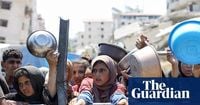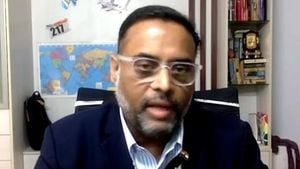Journalists reporting from Gaza are facing an unprecedented crisis as they grapple with starvation and dire living conditions, according to a rare joint statement from major international news organizations. On July 24, 2025, BBC News, Agence France-Presse (AFP), Associated Press (AP), and Reuters expressed deep concern for the local journalists who have been the sole eyes and ears on the ground amid the ongoing conflict in Gaza.
These journalists, who have been documenting the war for many months, are now struggling to feed themselves and their families, confronting the very hardships endured by the civilians they cover. The joint statement highlighted that “journalists endure many deprivations and hardships in war zones,” but the threat of starvation is a new and alarming development.
International media outlets depend heavily on Palestinian reporters within Gaza, as Israel restricts foreign journalists from entering the territory. This blockade has left local journalists isolated and vulnerable, with many unable to leave the enclave or receive adequate support. The news agencies urged Israeli authorities to allow journalists freer movement in and out of Gaza and stressed the critical need for sufficient food supplies to reach the population.
"We are desperately concerned for our journalists in Gaza, who are increasingly unable to feed themselves and their families," the statement said. "For many months, these independent journalists have been the world’s eyes and ears on the ground in Gaza. They are now facing the same dire circumstances as those they are covering."
The crisis extends beyond the journalistic community. Over 100 international aid organizations and human rights groups have warned of mass starvation spreading across Gaza, where a quarter of the population faces famine-like conditions. The World Health Organization’s director, Tedros Adhanom Ghebreyesus, described the situation as "mass starvation, and it's man-made," attributing it to the ongoing blockade.
Since early March 2025, Israel has prevented aid deliveries following a two-month ceasefire, and although the blockade was partially lifted after nearly two months, shortages of food and medicine have worsened. Israel and the United States have established a new aid system, managed by the Gaza Humanitarian Foundation (GHF), but hundreds of killings near GHF aid sites have been reported since its inception eight weeks ago.
The Gaza health ministry, run by Hamas, reported that since July 20, 2025, 45 Palestinians have died from malnutrition. Meanwhile, the international community has voiced mounting criticism over the humanitarian situation, with media watchdog Reporters Without Borders (RSF) warning that journalism in Gaza is nearing "extinction." RSF noted that over 200 journalists have been killed in Gaza since the war began in October 2023.
AFP expressed particular concern for its staff, describing the situation as "appalling" and warning that their lives are at risk. Omar al-Qattaa, a 35-year-old AFP photographer who was shortlisted for a Pulitzer Prize earlier this year, lamented, "We have no energy left due to hunger and lack of food." Freelance journalists working for international outlets have reported that hunger and lack of clean water are causing illness and exhaustion, severely impairing their ability to report.
A group of AFP journalists issued a stark warning this week: "Without immediate intervention, the last reporters in Gaza will die." The Society of Journalists at AFP reflected on the unprecedented nature of the crisis, stating, "We have lost journalists in conflicts: some have been injured; others taken prisoner. But none of us can ever remember seeing colleagues die of hunger." One AFP photographer shared on social media, "I no longer have the strength to work for the media. My body is thin and I can’t work any more."
The Committee to Protect Journalists (CPJ) has also called on Israeli authorities to "protect" and "feed" reporters in Gaza. Sara Qudah, CPJ's regional director, said, "Israel is starving Gazan journalists into silence. They are not just reporters, they are frontline witnesses, abandoned as international media were pulled out and denied entry." CPJ launched the "Voices From Gaza" video series, featuring Palestinian journalists describing the challenges they face, including starvation, dizziness, brain fog, and sickness.
The blockade and restrictions on media access have made Gaza one of the most dangerous places for journalists. Israel has accused some reporters of being "terror operatives," a charge condemned by media outlets such as Al Jazeera, which has been banned in Israel and claims its staff have been targeted by the Israeli military since the war began.
Israeli government spokesman David Mercer stated in December 2024, "We know that probably most journalists inside Gaza are operating under the auspices of Hamas, and until Hamas is destroyed, they will not be allowed to report freely." This stance has further complicated the ability of journalists to operate safely and independently within the territory.
Efforts to evacuate journalists have seen limited success. AFP managed to evacuate eight staff members and their families between January and April 2024 after months of negotiation. Recently, AFP and French Foreign Minister Jean-Noel Barrot urged Israel to allow the immediate evacuation of freelance contributors and their families, citing the deteriorating conditions and the threat of starvation.
The humanitarian situation in Gaza remains dire, with the blockade severely limiting the flow of essential goods. The United Nations has reported that Israeli military actions have resulted in over 1,000 Palestinians being killed while attempting to access food since late May 2025. Meanwhile, aid organizations such as Médecins Sans Frontières, Save the Children, and Oxfam have described their colleagues and the people they serve as "wasting away," though Israel has accused these charities of "serving the propaganda of Hamas."
The plight of journalists in Gaza is a stark reminder of the broader humanitarian crisis unfolding in the region. As frontline witnesses to the conflict, their ability to report freely and safely is crucial for the international community’s understanding of the situation. Yet, as they face starvation and increasing risks, the very survival of journalism in Gaza hangs in the balance.
The world’s major news agencies are united in their urgent call to Israeli authorities: allow journalists free movement and ensure that adequate food supplies reach Gaza. Without swift action, the last voices reporting from this embattled enclave may be silenced forever.





